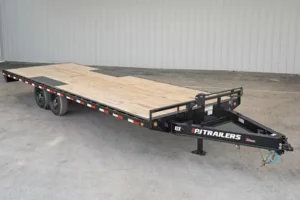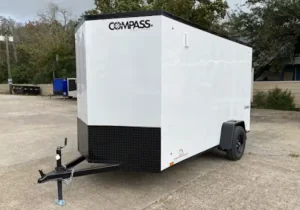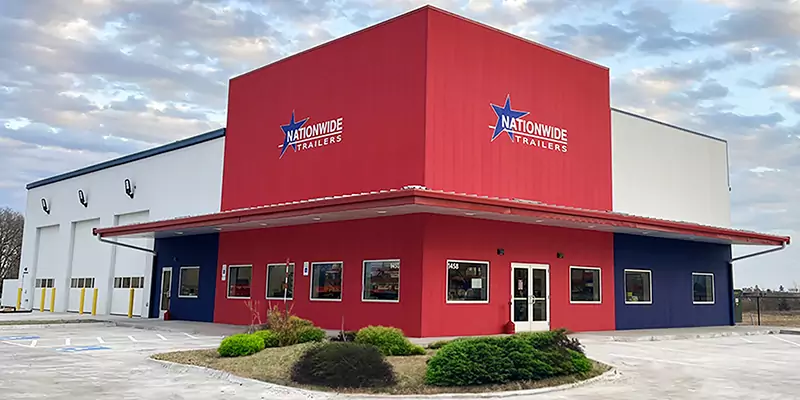
In the dynamic world of welding and fabrication, having the right trailer can significantly boost your productivity and efficiency. These mobile workstations not only transport your essential equipment but also provide a secure and organized workspace on the go. Whether you’re moving between job sites in Des Moines or taking on projects that require mobility, trailers are indispensable. This blog aims to guide welding and fabrication professionals in selecting, customizing, and maintaining trailers to meet their unique needs. We’ll explore different types of trailers, customization options, maintenance tips, and more, ensuring you make informed decisions that enhance your work experience.
Types of Trailers for Welders and Fabricators
In welding and fabrication, choosing the right trailer can make all the difference. There are various types of trailers, each designed for specific needs and applications. Understanding these options will help you select the best fit for your work.
Flatbed Trailers
Flatbed trailers are a versatile option for welders and fabricators. They provide an open platform, ideal for transporting large and irregularly shaped materials or equipment. If you frequently move heavy machinery or construction materials, a flatbed trailer might be your best bet. The flat surface makes loading and unloading a breeze, especially when dealing with bulky items.
Enclosed Trailers
Enclosed trailers offer protection from the elements, making them perfect for transporting tools and equipment that must remain dry and secure. They provide ample storage space and can be locked for added security. Enclosed trailers are suitable for professionals who carry valuable or sensitive equipment that could be damaged by weather or theft.
Utility Trailers
Utility trailers are a popular choice for those who need a balance between open space and protection. They are equipped with side rails and often have a gate, offering some security while allowing easy access to your materials. Utility trailers are versatile and can be used for various tasks, making them a practical choice for many welding and fabrication professionals.
Customization Options
To truly optimize your trailer for your specific needs, customization is key. Adding features like toolboxes, racks, and winches can transform a standard trailer into a mobile workshop tailored to your workflow.
Toolboxes and Storage Solutions
Incorporating toolboxes and storage into your trailer setup can significantly enhance your efficiency. They keep your tools organized and within reach, reducing the time spent looking for the right equipment. Choose toolboxes made from durable materials that can withstand the rigors of your work environment.
Winches and Lifts
For heavy lifting, incorporating winches and lifts into your trailer design can be a game-changer. These tools make loading and unloading heavy equipment much easier and safer. Ensure that the winches and lifts are rated for the weights you typically handle to avoid damage or accidents.
Trailer Maintenance and Safety
Regular maintenance is crucial to ensure the longevity and safety of your trailer. Neglecting maintenance can lead to costly repairs and downtime, negatively impacting your productivity.
Routine Inspections
Performing routine inspections is essential to identify any issues before they become major problems. Check the trailer’s brakes, tires, lights, and hitch regularly. Look for signs of wear and tear, and address any concerns promptly to ensure your trailer remains in top condition.
Selecting the Right Trailer for Your Business
Choosing the right trailer involves careful consideration of several factors, including payload capacity, towing vehicle compatibility, and the scope of your projects. Making the right choice can enhance your efficiency and profitability.
Assessing Your Needs
Before purchasing a trailer, assess your specific needs. Consider the typical materials and equipment you transport, as well as the distances and terrain you encounter. This assessment will help you determine the type and size of the trailer that best suits your requirements.
Considering Payload Capacity
Payload capacity is a critical factor in trailer selection. Overloading a trailer can lead to accidents and damage to both the trailer and your towing vehicle. Calculate the weight of your equipment and materials to ensure that your chosen trailer can safely carry your load.
Evaluating Towing Vehicle Compatibility
Ensure that your towing vehicle is compatible with the trailer you choose. Consider the vehicle’s towing capacity and hitch type. It’s essential to match the trailer’s weight and size to your vehicle’s capabilities to ensure safe and efficient transportation.
Conclusion
Trailers are indispensable tools for welding and fabrication professionals, offering mobility, organization, and efficiency. By understanding the different types of trailers, customizing them to suit your needs, and maintaining them properly, you can enhance your productivity and profitability. We encourage you to explore the various options available and share your experiences with trailers in the industry. Whether you’re in Des Moines or elsewhere, finding the right trailer can make all the difference in your work. For more information and to browse a selection of high-quality trailers, consider reaching out to Nationwide Trailers for expert advice and support.




